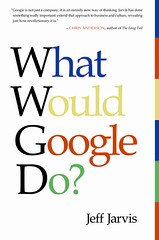Dale Reviews What Would Google Do
As you may have noticed on my new blog there is a heading titled Dale’s Book Choices. I added this section because I believe strongly in reading. Reading books nurtures the mind and is an enjoyable form of continuing learning and education. To this extent, I am offering my first book review of 2010. I am not a trained literary critic, so please do not expect too much. These periodic book review posts are simply intended to share with the velocity community the best that I have to offer in terms of reading recommendations.
Jeff Jarvis’ book, What Would Google Do is an exhausting composition about how the new order of the internet age can and arguably will reform traditional society. Jarvis surveys a myriad of subjects from business to religion to education. The thrust of the subject matter surrounds Google’s philosophy of moving power to the people by pushing information out to the edges of the human universe.
According to Jarvis, economic value, strength and power has traditionally been centralized and held by only a relatively few entities in the areas of business, religion and education. With knowledge and education tightly controlled, there is a scarcity that creates demand and value for those that hold the precious commodity. Google, in a sense, liberates information and allows it to be accessed freely in a manner that Jarvis calls the Gift Economy. With free and easily accessible access to information and knowledge, new networks form and begin to challenge traditional ones. Jarvis provides numerous examples of how these new networks better serve the interests of the constituents in business and the broader society. His term for this phenomenon is the “long tail effect”. The long tail effect says that the concentration of knowledge and power held by a few businesses, religious and educational institutions is compressed and stretched into a long tail that has accessibility to a much larger and more diverse population.
Jarvis presents a very self assured vision of the future without offering much in the way of practical limitations for his views. Each chapter could itself be a subject of a symposium that juxtaposes his views with those of practical concerns. The lack of point/counterpoint combined with the wide spectrum of covered subject matter adds up to a sense that the book is directional and thought provoking rather than practical and pragmatic. From this prospective, it is a recommended read. I think that it provides a general view of the new order for generations to come. For those in business that need to place bets on various business models it is without doubt valuable. For the more casual reader that simply wants an intellectual experience about what the world will look like, the book is relevant.
Finally, Jarvis references numerous web sites that I’ve personally visited and found interesting. All in all I would give this book a solid 4 out of 5 star rating.


![Reblog this post [with Zemanta]](http://img.zemanta.com/reblog_e.png?x-id=29bc36b3-a925-411b-8e77-6b1b7ebc5a87)